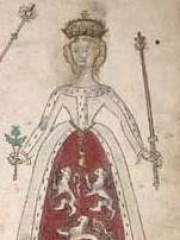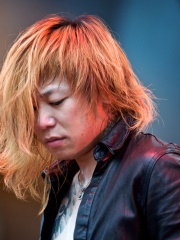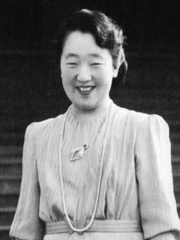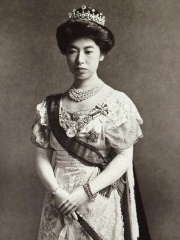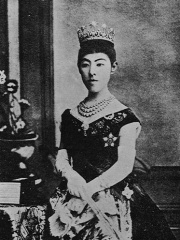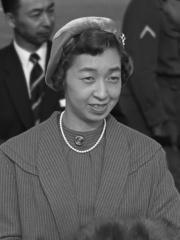Companion
Olivia Lufkin
1979 - today
 Olivia Lufkin
Olivia Lufkin
Olivia Lufkin (born December 9, 1979), known professionally as Olivia, is a Japanese-American singer and songwriter. Lufkin began her solo career after singing in the Japanese girl group D&D. She gained mainstream success in 2006 after creating songs for the fictional band Trapnest under the alias "Olivia Inspi' Reira (Trapnest)." The songs were used for the popular anime adaptation of Nana. Read more on Wikipedia
Her biography is available in 19 different languages on Wikipedia. Olivia Lufkin is the 792nd most popular companion (down from 785th in 2024), the 2,718th most popular biography from Japan (down from 2,129th in 2019) and the 5th most popular Japanese Companion.
Memorability Metrics
Page views of Olivia Lufkin by language
Among Companions
Among companions, Olivia Lufkin ranks 792 out of 784. Before her are Gloria, Princess of Thurn and Taxis, Euphemia de Ross, Edith Lucie Bongo, Juliana Awada, Carrie Johnson, and Aleska Diamond. After her are Ann Romney, Eva Elfie, Emily Willis, Martine Moïse, and Nga wai hono i te po.
Most Popular Companions in Wikipedia
Go to all RankingsGloria, Princess of Thurn and Taxis
1960 - Present
HPI: 51.83
Rank: 786
Euphemia de Ross
1333 - 1386
HPI: 51.81
Rank: 787
Edith Lucie Bongo
1964 - 2009
HPI: 49.28
Rank: 788
Juliana Awada
1974 - Present
HPI: 48.99
Rank: 789
Carrie Johnson
1988 - Present
HPI: 48.40
Rank: 790
Aleska Diamond
1988 - Present
HPI: 47.08
Rank: 791
Olivia Lufkin
1979 - Present
HPI: 46.64
Rank: 792
Ann Romney
1949 - Present
HPI: 45.98
Rank: 793
Eva Elfie
2000 - Present
HPI: 43.58
Rank: 794
Emily Willis
1998 - Present
HPI: 42.43
Rank: 795
Martine Moïse
1974 - Present
HPI: 41.41
Rank: 796
Nga wai hono i te po
1997 - Present
HPI: 30.78
Rank: 797
Contemporaries
Among people born in 1979, Olivia Lufkin ranks 517. Before her are Saša Ognenovski, Ransom Riggs, Juho Kuosmanen, Joanna Krupa, Felix Sturm, and Nao Shikata. After her are Robin Szolkowy, Charmane Star, Gilberto Martínez, Teemu Tainio, Jérémie Bréchet, and Barry Hawkins.
Others Born in 1979
Go to all RankingsSaša Ognenovski
SOCCER PLAYER
1979 - Present
HPI: 46.72
Rank: 511
Ransom Riggs
WRITER
1979 - Present
HPI: 46.71
Rank: 512
Juho Kuosmanen
FILM DIRECTOR
1979 - Present
HPI: 46.71
Rank: 513
Joanna Krupa
MODEL
1979 - Present
HPI: 46.70
Rank: 514
Felix Sturm
BOXER
1979 - Present
HPI: 46.67
Rank: 515
Nao Shikata
SOCCER PLAYER
1979 - Present
HPI: 46.65
Rank: 516
Olivia Lufkin
COMPANION
1979 - Present
HPI: 46.64
Rank: 517
Robin Szolkowy
SKATER
1979 - Present
HPI: 46.63
Rank: 518
Charmane Star
PORNOGRAPHIC ACTOR
1979 - Present
HPI: 46.55
Rank: 519
Gilberto Martínez
SOCCER PLAYER
1979 - Present
HPI: 46.53
Rank: 520
Teemu Tainio
SOCCER PLAYER
1979 - Present
HPI: 46.52
Rank: 521
Jérémie Bréchet
SOCCER PLAYER
1979 - Present
HPI: 46.52
Rank: 522
Barry Hawkins
SNOOKER
1979 - Present
HPI: 46.51
Rank: 523
In Japan
Among people born in Japan, Olivia Lufkin ranks 2,718 out of 6,245. Before her are Masaaki Sawanobori (1970), Showtaro Morikubo (1974), Kenji Koyama (1972), Nao Shikata (1979), Tadanari Lee (1985), and Tomoya Nagase (1978). After her are Shota Kanno (1984), Chisa Yokoyama (1969), Aka Akasaka (1988), Atsushi Yoneyama (1976), Kyo (1976), and Mike Havenaar (1987).
Others born in Japan
Go to all RankingsMasaaki Sawanobori
SOCCER PLAYER
1970 - Present
HPI: 46.67
Rank: 2,712
Showtaro Morikubo
ACTOR
1974 - Present
HPI: 46.67
Rank: 2,713
Kenji Koyama
SOCCER PLAYER
1972 - Present
HPI: 46.66
Rank: 2,714
Nao Shikata
SOCCER PLAYER
1979 - Present
HPI: 46.65
Rank: 2,715
Tadanari Lee
SOCCER PLAYER
1985 - Present
HPI: 46.65
Rank: 2,716
Tomoya Nagase
SINGER
1978 - Present
HPI: 46.64
Rank: 2,717
Olivia Lufkin
COMPANION
1979 - Present
HPI: 46.64
Rank: 2,718
Shota Kanno
SOCCER PLAYER
1984 - Present
HPI: 46.64
Rank: 2,719
Chisa Yokoyama
ACTOR
1969 - Present
HPI: 46.63
Rank: 2,720
Aka Akasaka
COMIC ARTIST
1988 - Present
HPI: 46.63
Rank: 2,721
Atsushi Yoneyama
SOCCER PLAYER
1976 - Present
HPI: 46.63
Rank: 2,722
Kyo
SINGER
1976 - Present
HPI: 46.63
Rank: 2,723
Mike Havenaar
SOCCER PLAYER
1987 - Present
HPI: 46.60
Rank: 2,724
Among Companions In Japan
Among companions born in Japan, Olivia Lufkin ranks 5. Before her are Empress Kōjun (1903), Empress Teimei (1884), Empress Shōken (1849), and Shigeko Higashikuni (1925).
Empress Kōjun
1903 - 2000
HPI: 67.91
Rank: 1
Empress Teimei
1884 - 1951
HPI: 65.94
Rank: 2
Empress Shōken
1849 - 1914
HPI: 63.59
Rank: 3
Shigeko Higashikuni
1925 - 1961
HPI: 62.97
Rank: 4
Olivia Lufkin
1979 - Present
HPI: 46.64
Rank: 5


